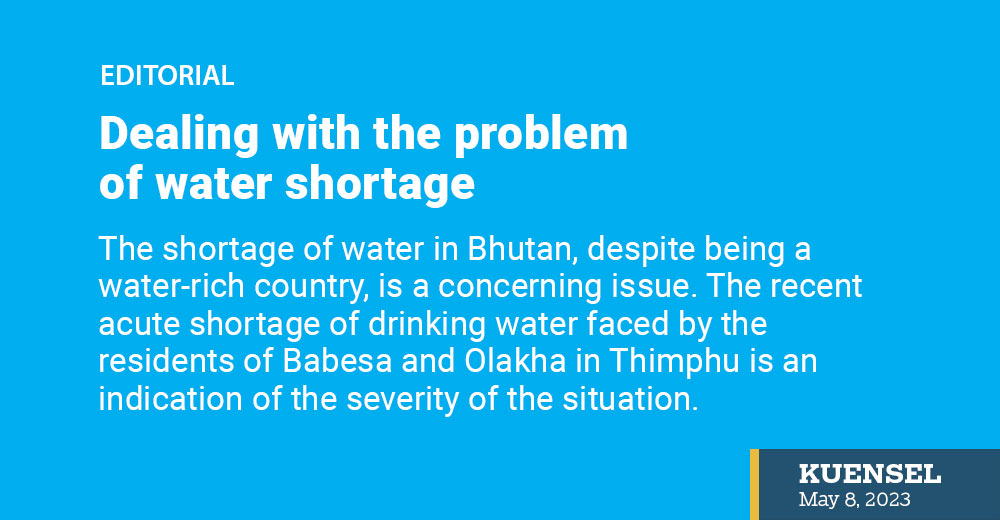The shortage of water in Bhutan, despite being a water-rich country, is a concerning issue. The recent acute shortage of drinking water faced by the residents of Babesa and Olakha in Thimphu is an indication of the severity of the situation. The problem arises due to inadequate water supply from the main source, caused by the decreasing amount of snowfall, which is the main feeder at the source, and the lack of rainfall during the dry season. Climate change exacerbates the situation and is likely to affect the water supply in the future. While the authorities are exploring all possible alternatives to fill the tank as soon as possible, a sustainable solution needs to be found.
The current approach of the authorities seems to focus on finding quick fixes. While this may provide temporary relief, it is not a long-term solution.
One approach to addressing the problem is to adopt a more sustainable approach to water management. This includes measures such as promoting rainwater harvesting, encouraging the use of water-efficient technologies, and implementing water conservation practices. Additionally, the authorities should invest in alternative sources of water, such as groundwater, to reduce reliance on the current sources. This requires a comprehensive and integrated approach that involves all stakeholders, including the government, communities, and businesses.
Furthermore, the authorities should prioritise water supply for essential uses such as drinking, cooking, and sanitation. This requires a robust water supply system that can provide uninterrupted water supply to households, especially during times of water scarcity. Additionally, water supply systems should be designed to provide equitable access to all households, regardless of their location and economic status.
The residents of the affected areas have expressed their concerns and urged the authorities to find a solution to the problem. The authorities must take these concerns seriously and involve the communities in the decision-making process. Community involvement can ensure that the solutions are appropriate and sustainable and that the communities are aware of the importance of water conservation and management.
Education and awareness campaigns can help to raise awareness about the importance of water conservation and management. This can be done through public campaigns, school programmes, and community meetings.
Another critical aspect to consider is the introduction of modern irrigation systems that can improve agricultural productivity in rural areas, lessening their reliance on rain-fed agriculture. This will not only contribute to food security but also reduce the pressure on water sources in urban areas. De-Suung Water Project has already made water available to over 1,383 acres of farmlands in the country.
Adequate funds and resources must be allocated to prioritise this issue, and the government should also ensure that stringent regulations are in place to govern the usage of water resource.


